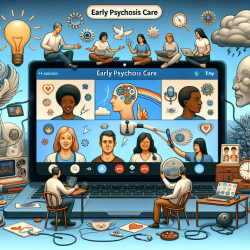Introduction
As a speech-language pathologist, the quest for innovative and effective strategies to enhance therapeutic outcomes is ongoing. The study titled The Effect of a Priest-Led Intervention on the Choice and Preference of Soda Beverages: A Cluster-Randomized Controlled Trial in Catholic Parishes offers intriguing insights that can be translated into our practice, particularly in the realm of online therapy services for children.
The Study's Core Findings
This study, conducted in Catholic parishes in Chimbote, Peru, explored the impact of a brief priest-led intervention on soda beverage choices among parishioners. The intervention consisted of a short sermon delivered by priests, emphasizing the importance of health and the benefits of choosing water over sugary drinks. Results indicated a significant reduction in soda selection among attendees exposed to the sermon, with an 8.2% decrease in soda choice at Week 1 and a 6.2% decrease at Week 3 post-intervention.
Translating Findings to Speech-Language Pathology
While the study focused on beverage choices, the underlying principle of leveraging trusted community figures to influence behavior can be applied to speech-language pathology. Here’s how practitioners can harness these insights:
- Engage Trusted Figures: Just as priests influenced parishioners, involving trusted figures in a child's life, such as teachers or family members, can enhance therapy outcomes. Encourage them to reinforce therapeutic goals in everyday interactions.
- Incorporate Brief, Focused Messages: The study demonstrated the power of concise, impactful messages. Develop short, targeted communication strategies that can be easily integrated into a child’s daily routine, reinforcing key therapy objectives.
- Utilize Online Platforms: With the rise of online therapy, use digital platforms to deliver these messages consistently. Videos or interactive sessions with familiar faces can help maintain engagement and reinforce learning.
Encouraging Further Research
The study opens avenues for further exploration in speech-language pathology. Consider these research questions:
- How can faith-based or community-led interventions be adapted for speech therapy to improve engagement and outcomes?
- What role can technology play in delivering these interventions effectively in an online setting?
- How can we measure the long-term impact of such interventions on speech and language development in children?
Conclusion
Incorporating community-led interventions, such as those demonstrated in the study, can offer a novel approach to enhancing speech-language therapy outcomes. By engaging trusted figures and utilizing concise, impactful messaging, practitioners can create a supportive environment that fosters positive change in children’s communication skills.
To read the original research paper, please follow this link: The Effect of a Priest-Led Intervention on the Choice and Preference of Soda Beverages: A Cluster-Randomized Controlled Trial in Catholic Parishes










